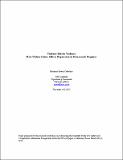| dc.description.abstract |
Recent research on human rights has examined the relationship between violent dissent and repression in democracies. Yet, it has not examined whether other forms of societal violence, most notably violent crime affect a country’s level of repression. Drawing on a principal-agent framework, this article develops two causal mechanisms about how violent crime may increase repression in democracies. Yet, it has not examined whether other forms of societal violence, most notably violent crime affect a country’s level of repression. Drawing on a principal-agent framework, this article develops two causal mechanisms about how violent crime deteriorate public safety, and thus citizens are likely to demand or support heavy hand policies. Second, citizens do not demand coercion but states resort to repression because non-controlled agents of security often impose order by employing abusive methods. Using the homicides rates as the primary measure of violent crime, I conduct multiple cross-national time-series estimates from 49 democracies between 1981 and 2004. Empirical results show that violent crime has not only a significant, but also a substantive effect on physical integrity rights violations under democracies. |

